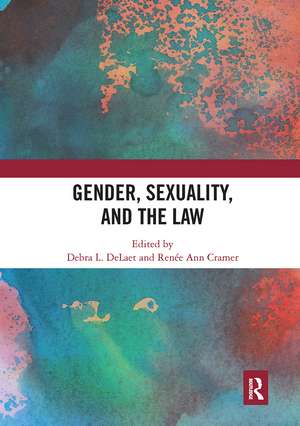Gender, Sexuality, and the Law
Editat de Debra L. DeLaet, Renée Ann Crameren Limba Engleză Paperback – 18 dec 2020
Many feminist scholars note a marked failure of law to achieve goals connected to women’s rights and gender equality. Despite its limitations, law provides aspirational norms that can be mobilized to hold institutions accountable and to provide material benefit to those excluded from systems of power. In conversation with each other, the chapters in this volume help to advance understanding of both the limitations and the potential of law as a tool for advancing democratic participation, rights, and justice around issues related to gender and sexuality. Contributors acknowledge, to varying degrees, that law has important symbolism and may be used as a lever to mobilize change. At the same time, some offer cautionary notes about the potential downside risks and unintended consequences of relying upon law in pursuit of women’s rights and gender equity.
Collectively, the chapters in this volume explore the disjuncture between the promise and expectation of legal reform and the lived experience of those laws by people intended as the beneficiaries of legal change. This book was originally published as a special issue of Global Discourse.
Preț: 382.36 lei
Nou
Puncte Express: 574
Preț estimativ în valută:
73.18€ • 76.11$ • 61.33£
73.18€ • 76.11$ • 61.33£
Carte tipărită la comandă
Livrare economică 14-28 martie
Preluare comenzi: 021 569.72.76
Specificații
ISBN-13: 9780367730840
ISBN-10: 0367730847
Pagini: 202
Dimensiuni: 152 x 229 x 11 mm
Greutate: 0.28 kg
Ediția:1
Editura: Taylor & Francis
Colecția Routledge
Locul publicării:Oxford, United Kingdom
ISBN-10: 0367730847
Pagini: 202
Dimensiuni: 152 x 229 x 11 mm
Greutate: 0.28 kg
Ediția:1
Editura: Taylor & Francis
Colecția Routledge
Locul publicării:Oxford, United Kingdom
Public țintă
Postgraduate and UndergraduateCuprins
Introduction: Gender, Sexuality, and the Law 1. Lost in Legation: the Gap Between Rhetoric and Reality in International Human Rights Law Governing Women’s Rights 2. What’s at Stake in the Treaty Reporting Process? Cuba and the United Nations’ Convention on Women’s Rights 3. Gender Politics and Geopolitics of International Criminal Law in Uganda 4. Spaces of International Gender Justice: A Reply to Baldez and DeLaet 5. Tacking Between the Global and the Local: A Reply to DeLaet and Bunting 6. What’s Law Got to Do with It?: A Reply to Baldez and Bunting 7. Attempting International Normative Change in Gender and the Law: A Reply to DeLaet, Baldez, and Bunting 8. ‘The Stigma of Western words’: Asylum Law, Transgender Identity and Sexual Orientation in South Africa 9. Gender, Sexuality, and the Right to a Non-Projected Future: a Reply to Camminga 10. Gender, Sexuality and the Limits of the Law 11. Wo/andering about Walls: A Reply to Elizabeth Mills 12. The Problem of Visibility in LGBT Human Rights: A Reply to Camminga and Mills 13. The Limits of Law in Securing Reproductive Freedoms: Midwife-Assisted Homebirth in the United States 14. Mothers Do Not Make Good Workers: The Role of Work/Life Balance Policies in Reinforcing Gendered Stereotypes 15. Embedded Exclusions: Exploring Gender Equality in Peru’s Participatory Democratic Framework 16. Gender, the Workplace and the Limits of the Law: A Reply to Cramer and Cote Hampson 17. Law’s Promises and its Limits: A Reply to Cramer and McNulty 18. Process is Insufficient: A Reply to Hampson and McNulty 19. Policymaking for Gender Equality: A Reply to Cramer, Cote Hampson, and McNulty
Notă biografică
Debra L. DeLaet is the David E. Maxwell Distinguished Professor of International Affairs at Drake University, USA. She is the author of several books, numerous articles, and book chapters on human rights, global health, and global gender issues.
Renée Ann Cramer is Professor of Law, Politics, and Society at Drake University, USA. Since 2004, she has been engaged in ethnographic and participant-observation field work with homebirth midwives, advocates for midwifery, and families who have had out-of-hospital births.
Renée Ann Cramer is Professor of Law, Politics, and Society at Drake University, USA. Since 2004, she has been engaged in ethnographic and participant-observation field work with homebirth midwives, advocates for midwifery, and families who have had out-of-hospital births.
Descriere
This volume examines the role of law as a tool for advancing women’s rights and gender equity in local, national, and global contexts. This book was originally published as a special issue of Global Discourse.
